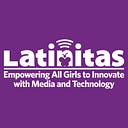Latinitas Reports from SXSW 2017
When you ask most young Latinas what their favorite cartoon is, they cite a character from Anime or Manga. Music? K-Pop. And where would Cheech be, my friends, without Chong? Also, if you ask young Latinas if they feel represented or even present at all in media — they will probably share the same sentiment as a panel of young Asian actors, media advocates and comedians I encountered at South by Southwest this week.
Panelist Phil Yu, better known as Angry Asian Man — his prolific blog critiquing Hollywood’s challenged history representing Asian Americans accurately — kicked off the March 12 panel discussion by expressing his frustration with the invisibility of Asians in American television, cinema and mainstream media overall. He said sometimes it’s hard to even see the stereotypes because the representation isn’t even there. Yu’s not alone in his frustration with 50K followers on Twitter handle @angryasianman, which has even been developed as a quasi-character in an upcoming stream series.
Comedian Jenny Yang took a moment to poll the audience to check if everyone was aware of the stereotypes of East Asian people. The consensus was a resounding yes. Audience members yelled out: Exotic. Foreign. Martial Artists. Smart. Good at Tech. Bad drivers. When you match those descriptions against the complexity of what is Asian identity: a diversity that includes being Chinese, Japanese, Korean, Vietnamese, Indonesian, Filipino, Laotian,Taiwanese, Thai, Nepalese and so many other origins — the stereotypes look even more ridiculous, even more foreign from the reality of being Asian in the United States.
Yu and Dante Basco, known for his indelible role as the leader of the Lost Boys in the Peter Pan epic “Hook” (Rufio! Rufio! Rufio!), addressed the invisibility issue more deeply. Yu explained that while the 2016 film “The Great Wall” might open people’s eyes to Asian culture, it also cast a Caucasian lead to “save China,” instigating the hashtag #thanksMattDamon — a response from the community that Asian movies should be seeking Asian leads. Scarlett Johansson’s role as Motoko Kusanagi in “Ghost in the Shell,” a movie based on the Japanese Manga comic book of the same name, came up as another example of a long line of American films whitewashing Asian characters.
Basco, a Filipino American, rarely if ever played a Filipino and mostly played generic “brown guy” identities or other ethnicities such as Native American, but he feels a wave of change coming in the industry.
“Where I felt like I had to play those parts to work, people like Aziz Ansari are opening it up for Asians to be themselves,” he explained.
Yu said he just “wants to be able to watch an Asian person be killed off a show or leave it without feeling devastated because they were the one Asian on that network in a leading role.”
Minji Chang talked about the pathway of a young Asian artist and about her efforts creating a space for expression outside a system that is not being inclusive. Minji helped found Kollaboration, a movement supporting Asian Americans & Pacific Islanders in entertainment & media since 2000. Empowerment Through Entertainment.
Chang was backed up by Yang, who closed the panel with a call to action:
“Our people need to go out and support our people. The networks, the money — when they see more Asians supporting Asian things — we’ll see the change.”
About the Writer
Laura Donnelly was a book publicist for eight years in New York City, working with authors such as Michael Crichton, Erica Jong, Maya Angelou and former President Jimmy Carter, until she realized she wanted to generate her own media. She co-founded Latinitas Magazine and Outreach at the University of Texas in 2002 and is strongly dedicated to diversity and empowering Latina youth.
